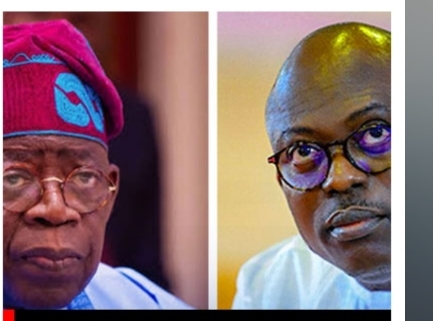FULL DETAILS: Fubara reacts to Tinubu’s emergency rule in Rivers
Tinubu’s Administrator Ibas Is Pouring Petrol On Fire In Rivers State; Fubara Remains Governor, Says Activist Briggs
Tinubu’s Administrator Ibas Is Pouring Petrol On Fire In Rivers State; Fubara Remains Governor, Says Activist Briggs
She declared pointedly that Ibas is not welcome in the state.
Niger Delta human rights activist, Ann-Kio Briggs, has accused the Rivers State Administrator, Ibok Ete Ibas, of bringing violence to the state while failing to foster peace, contrary to President Bola Tinubu’s stated intentions.
She declared pointedly that Ibas is not welcome in the state.
Briggs shared her views during an appearance on Channels Television on Monday, alleging that Ibas is “pouring petrol on the fire” he was sent by the President to extinguish.
“First of all, I can assure you that he is pouring petrol on a fire Mr. President believes was on,” Ann-Kio Briggs stated.
“So, he was told to come and pour water on that fire, to quench it. Well, he has done nothing of the sort. I have told you that he has removed people who were constitutionally and democratically in governance.”
“There were no issues, and he came along and removed everybody. Even in the Government House, it is alleged that he has removed the pictures of Siminalayi Fubara. I repeat: Siminalayi Fubara remains the governor of Rivers State.”
Earlier, the President of the Nigerian Bar Association (NBA), Afam Osigwe, SAN, had strongly condemned the National Assembly’s ratification of President Bola Tinubu’s declaration of a state of emergency in Rivers State.
The declaration led to the suspension of the elected governor, deputy governor, and members of the state assembly amid a political crisis.
Speaking on Arise Television on Thursday night, Osigwe emphasised that the NBA considers the proclamation of a state of emergency unconstitutional, rendering any ratification by the National Assembly invalid.
He argued that the Constitution does not grant the President the power to remove elected officials — such as the governor, deputy governor, or state legislators — under the guise of a state of emergency.
“Our position at the Nigerian Bar Association is that the proclamation of a state of emergency in Rivers State is unconstitutional. And being unconstitutional, the removal or suspension of the governor, his deputy, and the State House of Assembly, in our view, are also unconstitutional.
“And being unconstitutional, there’s nothing the National Assembly can ratify, because you can’t place something on nothing and expect it to stand.”
“Procedurally too, from the reports I have read, both chambers of the National Assembly passed the same by voice vote. To my mind, when a constitution requires that a certain action should be done by a two-thirds majority, you don’t do so by a voice vote.”
“You take a physical vote, count, and declare the number of persons present and the number who actually voted, to ensure the constitutional requirement has been met.”
“While listening to the Senate President, I heard him refer to Section 114, and I thought that section should have raised a question as to whether the National Assembly can ratify the President’s declaration that the governor stood suspended — and so too the deputy and the House. Because that Section 114 has a proviso stating that the National Assembly cannot remove a governor or his deputy.”
“So, if we’re a nation truly committed to obeying our laws, I think the laws clearly stare us in the face that there’s something wrong with ratifying that resolution.”
“I also understand that there’s a proposal to have eminent Nigerians resolve the issue, and this supports the Nigerian Bar Association’s position — that the problem in Rivers State cannot be solved through the declaration of a state of emergency.”
“It can only be solved through political dialogue involving the major players, whose egos have prevented them from putting the people, their welfare, and the security of Rivers State above all else.”
“And it’s become a case of who wins, who blinks first, who can pull the stronger string — whatever it takes to get the other person out of power. And in all of this, the people don’t count.”


























